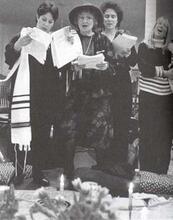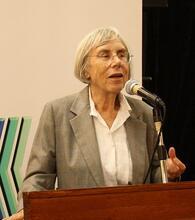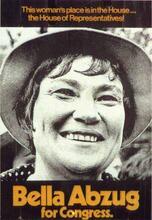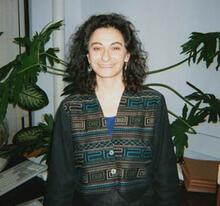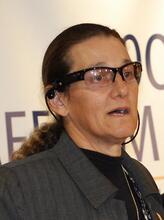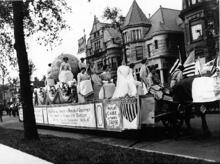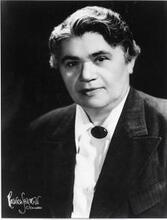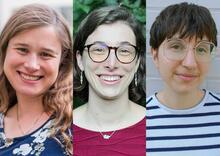Chai Feldblum
Chai Feldblum has played a number of influential roles throughout her life: an advocate for the rights of LGBTQ+ people and people with disabilities, as well as workplace equity in general; a scholar and law professor at Georgetown University Law Center; an architect of civil rights legislation, including the Americans with Disabilities Act; a clerk to the United States Supreme Court; a lawyer in private practice advising employers on how to create respectful workplaces; a commissioner of the Equal Employment Opportunity Commission; and a member of the United States AbilityOne Commission. Feldblum was raised in an Orthodox family and community, which instilled in her a deep passion for learning, reading, and social justice. She is known for her trailblazing advocacy and pioneering lawmaking spanning multiple areas of law, public policy, and legal education.
Family and Education
Chai Feldblum was born in New York City on April 30, 1959, to Meyer Simcha and Esther Feldblum and was raised in the city’s Washington Heights neighborhood. She has two brothers, Avi and Sholom, and a sister, Miriam. Born in Lithuania, Feldblum’s father was the only member of his immediate family to survive the Holocaust, after hiding with his aunt and uncle and cousins in the forests of Poland. He later came to the United States and obtained his ordination and PhD in Talmudic studies from Yeshiva University, following which he became a rabbi, professor, and one of the leading Talmudic scholars of his generation. Feldblum’s mother was equally accomplished and dedicated to learning and scholarship, receiving her PhD in Jewish history from Columbia University and teaching at Brooklyn College. She came from a long line of Orthodox rabbis, including Chai’s grandfather, Rabbi Ephraim Yolles, the Samborer Rebbe of Philadelphia. She died tragically in a car accident at age 41 when Chai was fifteen; her dissertation on “The American Catholic Press and the Jewish State 1917-1959” was published posthumously as a book.
Raised in an Orthodox family and community, Feldblum aspired throughout her childhood and adolescence to become one of the first female Talmud scholars. She attended the Yeshiva University High School for Girls in Manhattan and, at sixteen, enrolled at Barnard College, where she majored in Ancient Studies. She spent her sophomore year of college at Michlalla, an Orthodox women’s seminary in Jerusalem.
In college, Feldblum was exposed for the first time to feminism, as well as the possibility that she could live openly as a lesbian. She left Orthodox Judaism at the age of eighteen but maintained a deep respect for religious traditions and values, which surfaced throughout her career. She graduated from Barnard in 1979 summa cum laude and Phi Beta Kappa. Following her graduation, she was a health care advocate with the Population Resource Center, a Revson Fellow with the Congresswomen’s Caucus, and a Legislative Assistant for Congresswoman Barbara Mikulski. She subsequently enrolled at Harvard Law School, where she served on the Board of Editors of the Harvard Law Review and as Notes Editor of the Journal on Legislation. During her law school career, Feldblum was awarded the Sears Prize, granted to the two highest-ranking second-year law students. She graduated magna cum laude in 1985.
Legal and Legislative Career: LGBTQ+ and Disability Rights Advocacy
After her graduation from Harvard Law School, Feldblum served as a law clerk first for federal judge Frank M. Coffin on the United States Court of Appeals for the First Circuit and then for Justice Harry A. Blackmun of the United States Supreme Court. She then entered the world of lawmaking, policy, and advocacy. She served as Director of Legal Research for the AIDS Action Council from 1987 to 1988 and then as Legislative Counsel for the AIDS Project of the American Civil Liberties Union from 1988 to 1991. The AIDS epidemic continued to rage, and Feldblum sought to help the gay community of which she was a part. Through that work, she became the lead drafter of the Americans with Disabilities Act, landmark legislation that became law in 1990 and established an array of first-time protections for people with disabilities, including people with AIDS, in employment, public accommodations, transportation, communications, and other areas.
In 1991, Feldblum joined the faculty of Georgetown University Law Center, where she launched the Federal Legislation Clinic and taught generations of students what she referred to as “legislative lawyering”—legal work in the arena of drafting and passing legislation. She taught classes on legislation; administrative law; sexuality, gender, and the law; and disability and the law. Throughout her tenure at Georgetown Law, she was a mentor to countless law students and a dynamic, inspiring, and beloved colleague and professor. Feldblum also published dozens of scholarly articles, particularly in the area of LGBTQ+ rights.
During her time at Georgetown University Law Center, Feldblum remained engaged in various facets of public life and policy, including deeply influential work in the area of LGBTQ+ rights. In 1993, she became the legal director for the Campaign for Military Service, a group that sought to overturn the policies that prohibited gay and bisexual people from serving openly in the United States military. While serving as a consultant to the Human Rights Campaign Fund and the National Lesbian and Gay Task Force, she led the drafting and negotiating of the Employment Non-Discrimination Act, a bill to prohibit employment discrimination based on sexual orientation and gender identity. Later, Feldblum founded the Moral Values Project, which was inspired by the values of her Orthodox Jewish upbringing. The premise of the project was that in order for LGBTQ+ people to achieve full equality, the rights of LGBTQ+ people must be viewed as a moral good—and that LGBTQ+ people were not simply to be tolerated but must be embraced as morally good.
Anti-Discrimination in Employment Work
Feldblum’s efforts also extended into other critical areas of rights and policy. Later in her tenure at Georgetown University Law Center, she worked with colleagues to launch Georgetown’s Workplace Flexibility 2010 project, which engaged with lawmakers, labor and employment organizations, and various stakeholders to advance workplace flexibility of all kinds, including flexible work arrangements, employee leave and time off, and career flexibility. Feldblum and her students at the Federal Legislation Clinic also represented the disability coalition that led the successful effort to enact the ADA Amendments of 2008, which restored important protections for disabled people following setbacks in the courts over the interpretation of the ADA.
In 2009, Feldblum’s tenure at Georgetown Law came to a close after President Barack Obama appointed her as a commissioner of the Equal Employment Opportunity Commission, the federal agency that enforces federal employment anti-discrimination laws. First as a recess appointee and then confirmed by the Senate in 2010, Feldlblum became the first and only openly LGBTQ+ person to serve on the EEOC. While serving on the EEOC, she helped the agency issue regulations under Section 501 of the Rehabilitation Act of 1973, which established requirements for the representation of people with disabilities in the federal workforce. She also played a leading role in the EEOC’s issuance of several landmark decisions, including that discrimination on the basis of gender identity (Macy v. Holder) and sexual orientation (Baldwin v. Foxx) constitutes unlawful discrimination on the basis of sex.
In 2019, Feldblum stepped down from the EEOC and became a partner at the law firm of Morgan, Lewis & Bockius, where she advised employers on the design of respectful workplaces and the prevention of unlawful employment practices. She left private practice in 2021.
In August 2021, President Joe Biden appointed Feldblum to the AbilityOne Commission, an agency that leverages federal procurement contracts to provide employment opportunities for people with significant disabilities. She became Vice Chair of the Commission.
Personal Life
Feldblum’s partner is Nan Hunter, a law professor whom she met while working on the AIDS Project of the ACLU. Feldblum is a lesbian and has a psychiatric disability of anxiety disorder.
Marnin, Seth. “Sitting Down with Chai Feldblum.” MyJewishLearning, October 24, 2019.


